Analyzing Easyjet's Airline Services
VerifiedAdded on 2020/10/05
|13
|4141
|54
AI Summary
The assignment delves into the operations management of Easyjet, analyzing its services from the perspective of travel agencies. It examines how factors such as appeal, convenience, prior experience, price, and purpose of trip influence customers' decisions when choosing an airline company. The report concludes that Easyjet's cost leadership strategy is suitable for increasing their market share and customer base.
Contribute Materials
Your contribution can guide someone’s learning journey. Share your
documents today.
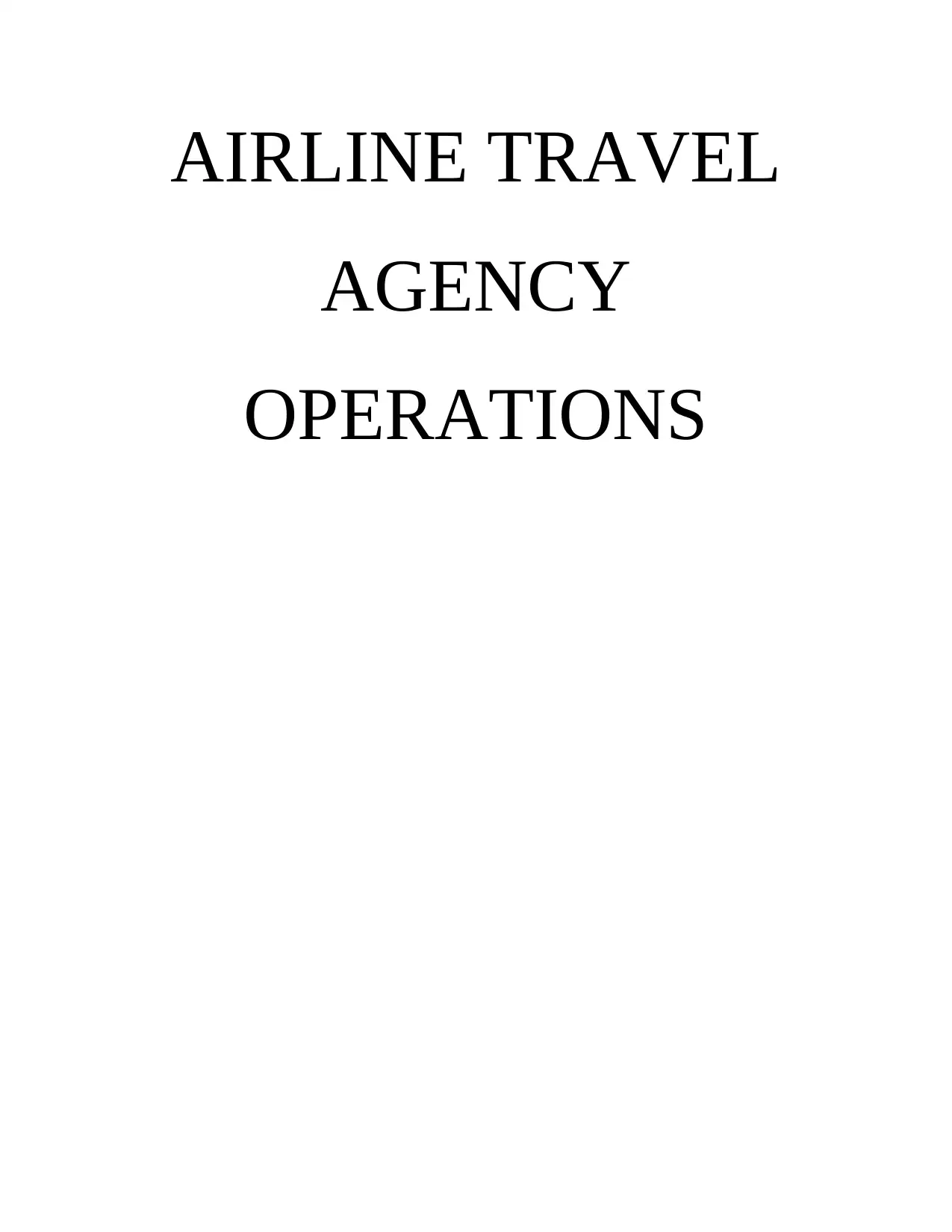
AIRLINE TRAVEL
AGENCY
OPERATIONS
AGENCY
OPERATIONS
Secure Best Marks with AI Grader
Need help grading? Try our AI Grader for instant feedback on your assignments.
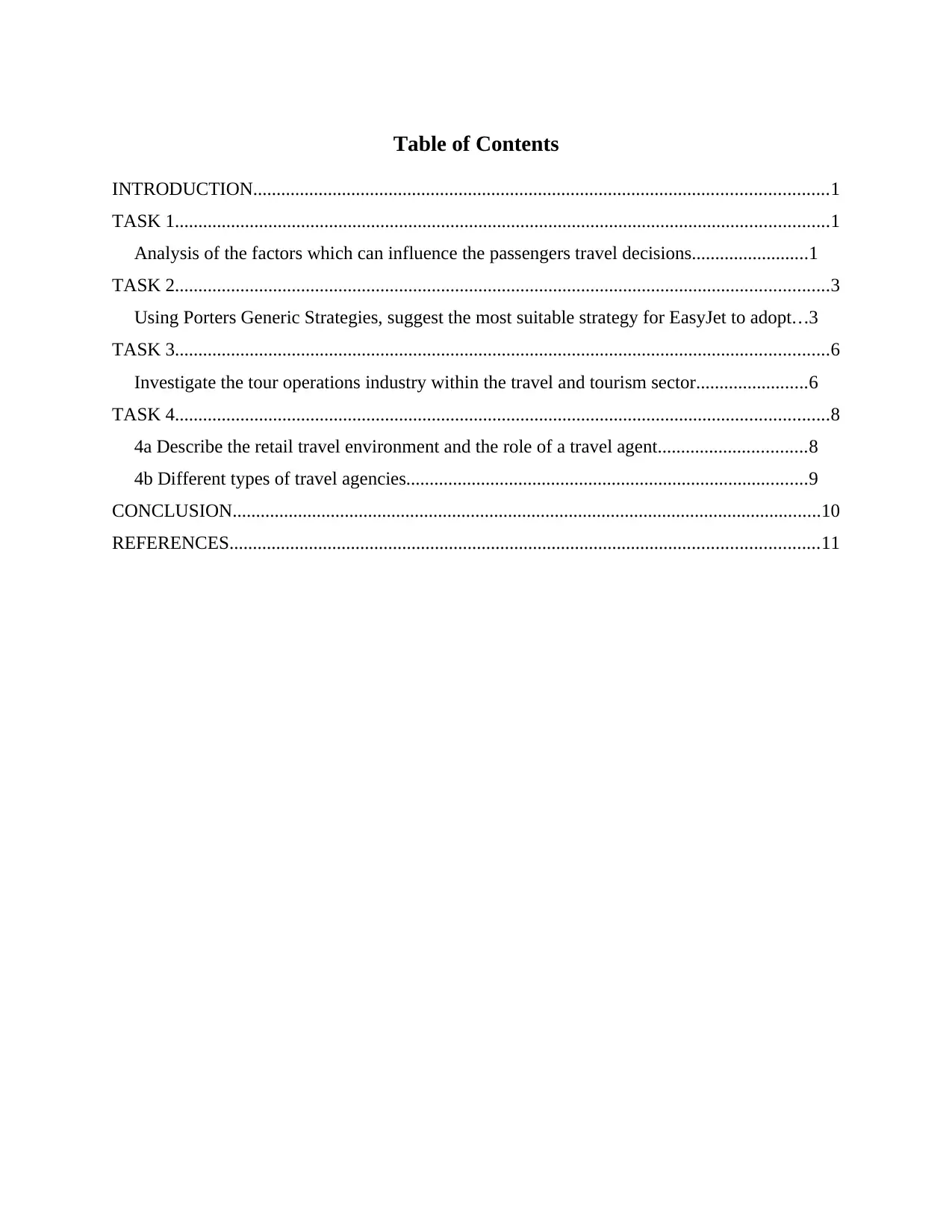
Table of Contents
INTRODUCTION...........................................................................................................................1
TASK 1............................................................................................................................................1
Analysis of the factors which can influence the passengers travel decisions.........................1
TASK 2............................................................................................................................................3
Using Porters Generic Strategies, suggest the most suitable strategy for EasyJet to adopt...3
TASK 3............................................................................................................................................6
Investigate the tour operations industry within the travel and tourism sector........................6
TASK 4............................................................................................................................................8
4a Describe the retail travel environment and the role of a travel agent................................8
4b Different types of travel agencies......................................................................................9
CONCLUSION..............................................................................................................................10
REFERENCES..............................................................................................................................11
INTRODUCTION...........................................................................................................................1
TASK 1............................................................................................................................................1
Analysis of the factors which can influence the passengers travel decisions.........................1
TASK 2............................................................................................................................................3
Using Porters Generic Strategies, suggest the most suitable strategy for EasyJet to adopt...3
TASK 3............................................................................................................................................6
Investigate the tour operations industry within the travel and tourism sector........................6
TASK 4............................................................................................................................................8
4a Describe the retail travel environment and the role of a travel agent................................8
4b Different types of travel agencies......................................................................................9
CONCLUSION..............................................................................................................................10
REFERENCES..............................................................................................................................11
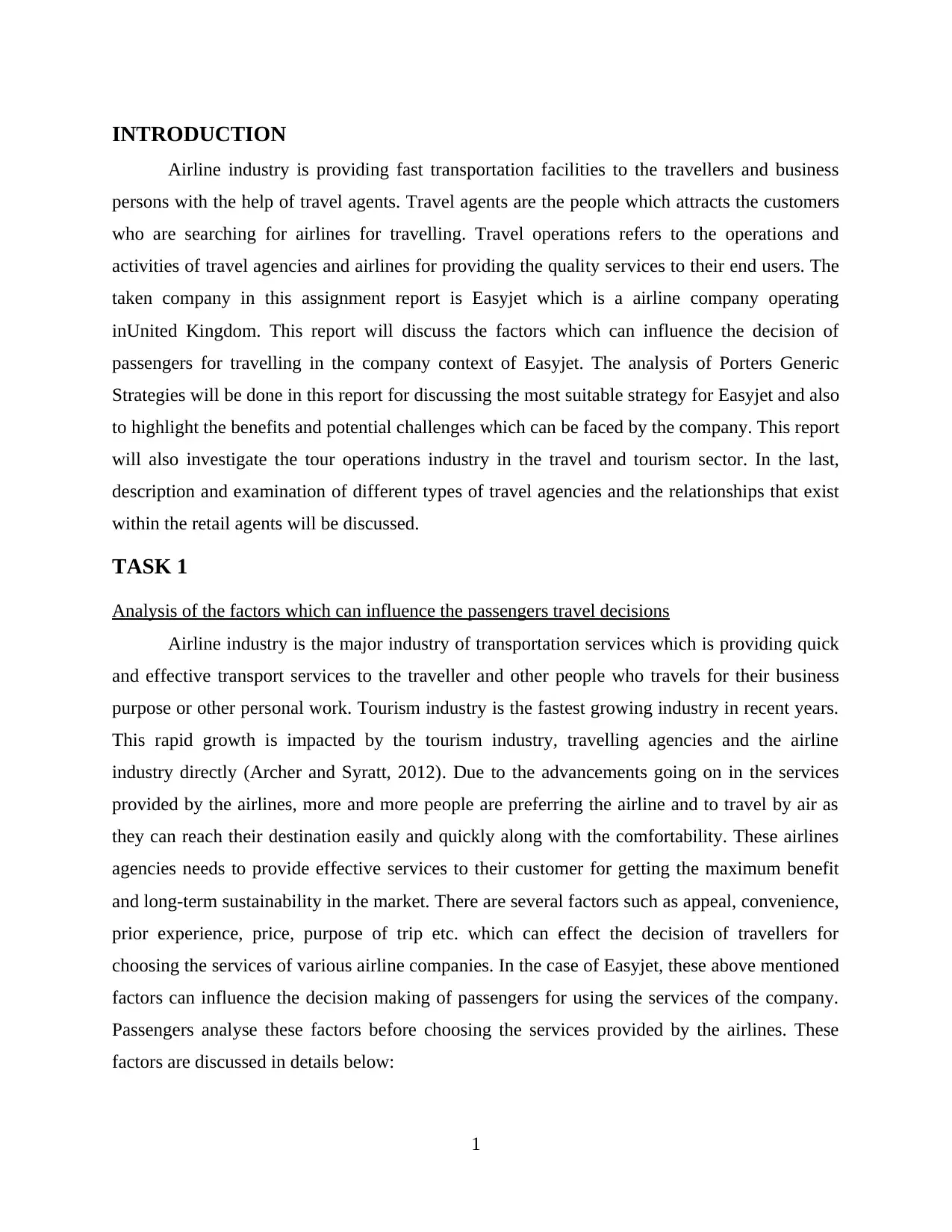
INTRODUCTION
Airline industry is providing fast transportation facilities to the travellers and business
persons with the help of travel agents. Travel agents are the people which attracts the customers
who are searching for airlines for travelling. Travel operations refers to the operations and
activities of travel agencies and airlines for providing the quality services to their end users. The
taken company in this assignment report is Easyjet which is a airline company operating
inUnited Kingdom. This report will discuss the factors which can influence the decision of
passengers for travelling in the company context of Easyjet. The analysis of Porters Generic
Strategies will be done in this report for discussing the most suitable strategy for Easyjet and also
to highlight the benefits and potential challenges which can be faced by the company. This report
will also investigate the tour operations industry in the travel and tourism sector. In the last,
description and examination of different types of travel agencies and the relationships that exist
within the retail agents will be discussed.
TASK 1
Analysis of the factors which can influence the passengers travel decisions
Airline industry is the major industry of transportation services which is providing quick
and effective transport services to the traveller and other people who travels for their business
purpose or other personal work. Tourism industry is the fastest growing industry in recent years.
This rapid growth is impacted by the tourism industry, travelling agencies and the airline
industry directly (Archer and Syratt, 2012). Due to the advancements going on in the services
provided by the airlines, more and more people are preferring the airline and to travel by air as
they can reach their destination easily and quickly along with the comfortability. These airlines
agencies needs to provide effective services to their customer for getting the maximum benefit
and long-term sustainability in the market. There are several factors such as appeal, convenience,
prior experience, price, purpose of trip etc. which can effect the decision of travellers for
choosing the services of various airline companies. In the case of Easyjet, these above mentioned
factors can influence the decision making of passengers for using the services of the company.
Passengers analyse these factors before choosing the services provided by the airlines. These
factors are discussed in details below:
1
Airline industry is providing fast transportation facilities to the travellers and business
persons with the help of travel agents. Travel agents are the people which attracts the customers
who are searching for airlines for travelling. Travel operations refers to the operations and
activities of travel agencies and airlines for providing the quality services to their end users. The
taken company in this assignment report is Easyjet which is a airline company operating
inUnited Kingdom. This report will discuss the factors which can influence the decision of
passengers for travelling in the company context of Easyjet. The analysis of Porters Generic
Strategies will be done in this report for discussing the most suitable strategy for Easyjet and also
to highlight the benefits and potential challenges which can be faced by the company. This report
will also investigate the tour operations industry in the travel and tourism sector. In the last,
description and examination of different types of travel agencies and the relationships that exist
within the retail agents will be discussed.
TASK 1
Analysis of the factors which can influence the passengers travel decisions
Airline industry is the major industry of transportation services which is providing quick
and effective transport services to the traveller and other people who travels for their business
purpose or other personal work. Tourism industry is the fastest growing industry in recent years.
This rapid growth is impacted by the tourism industry, travelling agencies and the airline
industry directly (Archer and Syratt, 2012). Due to the advancements going on in the services
provided by the airlines, more and more people are preferring the airline and to travel by air as
they can reach their destination easily and quickly along with the comfortability. These airlines
agencies needs to provide effective services to their customer for getting the maximum benefit
and long-term sustainability in the market. There are several factors such as appeal, convenience,
prior experience, price, purpose of trip etc. which can effect the decision of travellers for
choosing the services of various airline companies. In the case of Easyjet, these above mentioned
factors can influence the decision making of passengers for using the services of the company.
Passengers analyse these factors before choosing the services provided by the airlines. These
factors are discussed in details below:
1
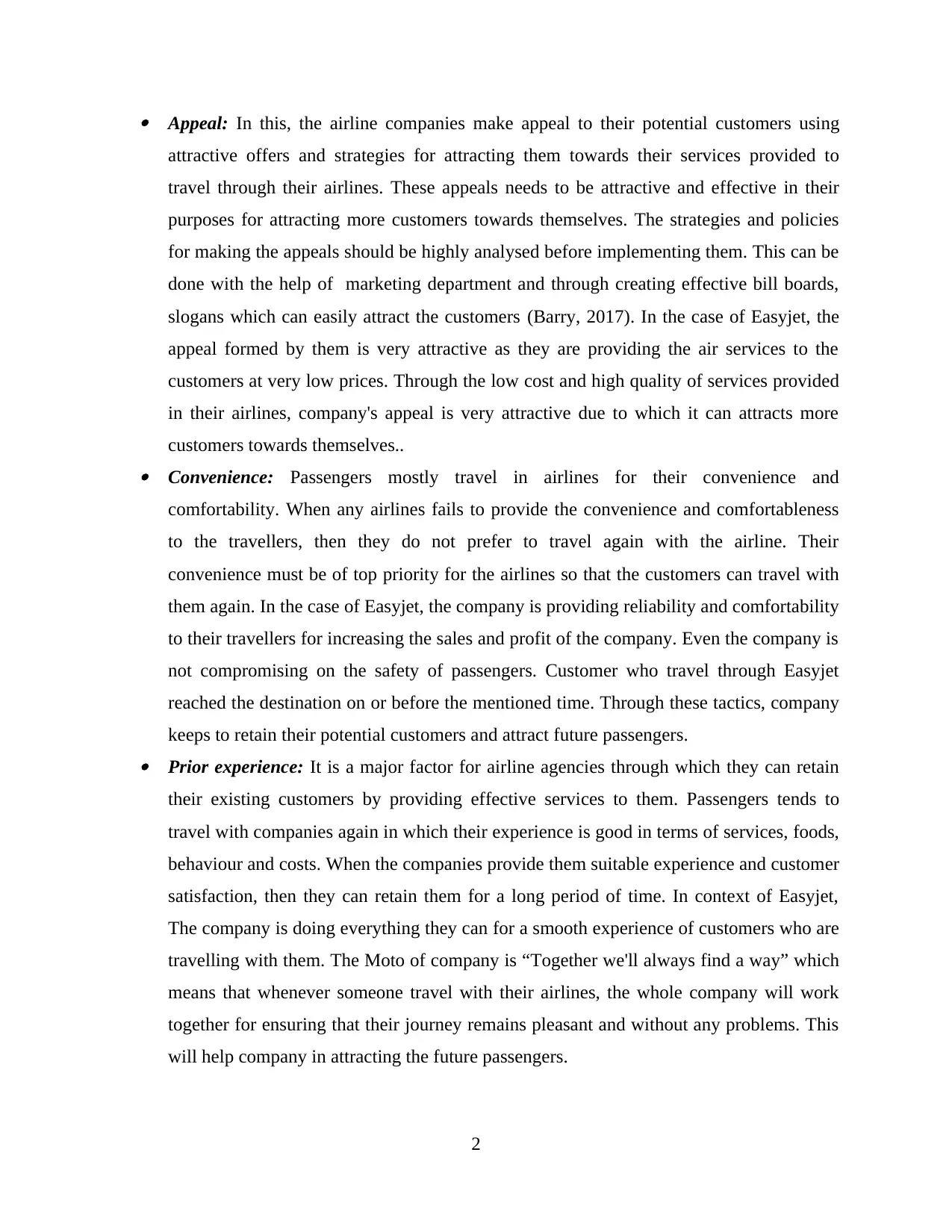
Appeal: In this, the airline companies make appeal to their potential customers using
attractive offers and strategies for attracting them towards their services provided to
travel through their airlines. These appeals needs to be attractive and effective in their
purposes for attracting more customers towards themselves. The strategies and policies
for making the appeals should be highly analysed before implementing them. This can be
done with the help of marketing department and through creating effective bill boards,
slogans which can easily attract the customers (Barry, 2017). In the case of Easyjet, the
appeal formed by them is very attractive as they are providing the air services to the
customers at very low prices. Through the low cost and high quality of services provided
in their airlines, company's appeal is very attractive due to which it can attracts more
customers towards themselves.. Convenience: Passengers mostly travel in airlines for their convenience and
comfortability. When any airlines fails to provide the convenience and comfortableness
to the travellers, then they do not prefer to travel again with the airline. Their
convenience must be of top priority for the airlines so that the customers can travel with
them again. In the case of Easyjet, the company is providing reliability and comfortability
to their travellers for increasing the sales and profit of the company. Even the company is
not compromising on the safety of passengers. Customer who travel through Easyjet
reached the destination on or before the mentioned time. Through these tactics, company
keeps to retain their potential customers and attract future passengers. Prior experience: It is a major factor for airline agencies through which they can retain
their existing customers by providing effective services to them. Passengers tends to
travel with companies again in which their experience is good in terms of services, foods,
behaviour and costs. When the companies provide them suitable experience and customer
satisfaction, then they can retain them for a long period of time. In context of Easyjet,
The company is doing everything they can for a smooth experience of customers who are
travelling with them. The Moto of company is “Together we'll always find a way” which
means that whenever someone travel with their airlines, the whole company will work
together for ensuring that their journey remains pleasant and without any problems. This
will help company in attracting the future passengers.
2
attractive offers and strategies for attracting them towards their services provided to
travel through their airlines. These appeals needs to be attractive and effective in their
purposes for attracting more customers towards themselves. The strategies and policies
for making the appeals should be highly analysed before implementing them. This can be
done with the help of marketing department and through creating effective bill boards,
slogans which can easily attract the customers (Barry, 2017). In the case of Easyjet, the
appeal formed by them is very attractive as they are providing the air services to the
customers at very low prices. Through the low cost and high quality of services provided
in their airlines, company's appeal is very attractive due to which it can attracts more
customers towards themselves.. Convenience: Passengers mostly travel in airlines for their convenience and
comfortability. When any airlines fails to provide the convenience and comfortableness
to the travellers, then they do not prefer to travel again with the airline. Their
convenience must be of top priority for the airlines so that the customers can travel with
them again. In the case of Easyjet, the company is providing reliability and comfortability
to their travellers for increasing the sales and profit of the company. Even the company is
not compromising on the safety of passengers. Customer who travel through Easyjet
reached the destination on or before the mentioned time. Through these tactics, company
keeps to retain their potential customers and attract future passengers. Prior experience: It is a major factor for airline agencies through which they can retain
their existing customers by providing effective services to them. Passengers tends to
travel with companies again in which their experience is good in terms of services, foods,
behaviour and costs. When the companies provide them suitable experience and customer
satisfaction, then they can retain them for a long period of time. In context of Easyjet,
The company is doing everything they can for a smooth experience of customers who are
travelling with them. The Moto of company is “Together we'll always find a way” which
means that whenever someone travel with their airlines, the whole company will work
together for ensuring that their journey remains pleasant and without any problems. This
will help company in attracting the future passengers.
2
Secure Best Marks with AI Grader
Need help grading? Try our AI Grader for instant feedback on your assignments.
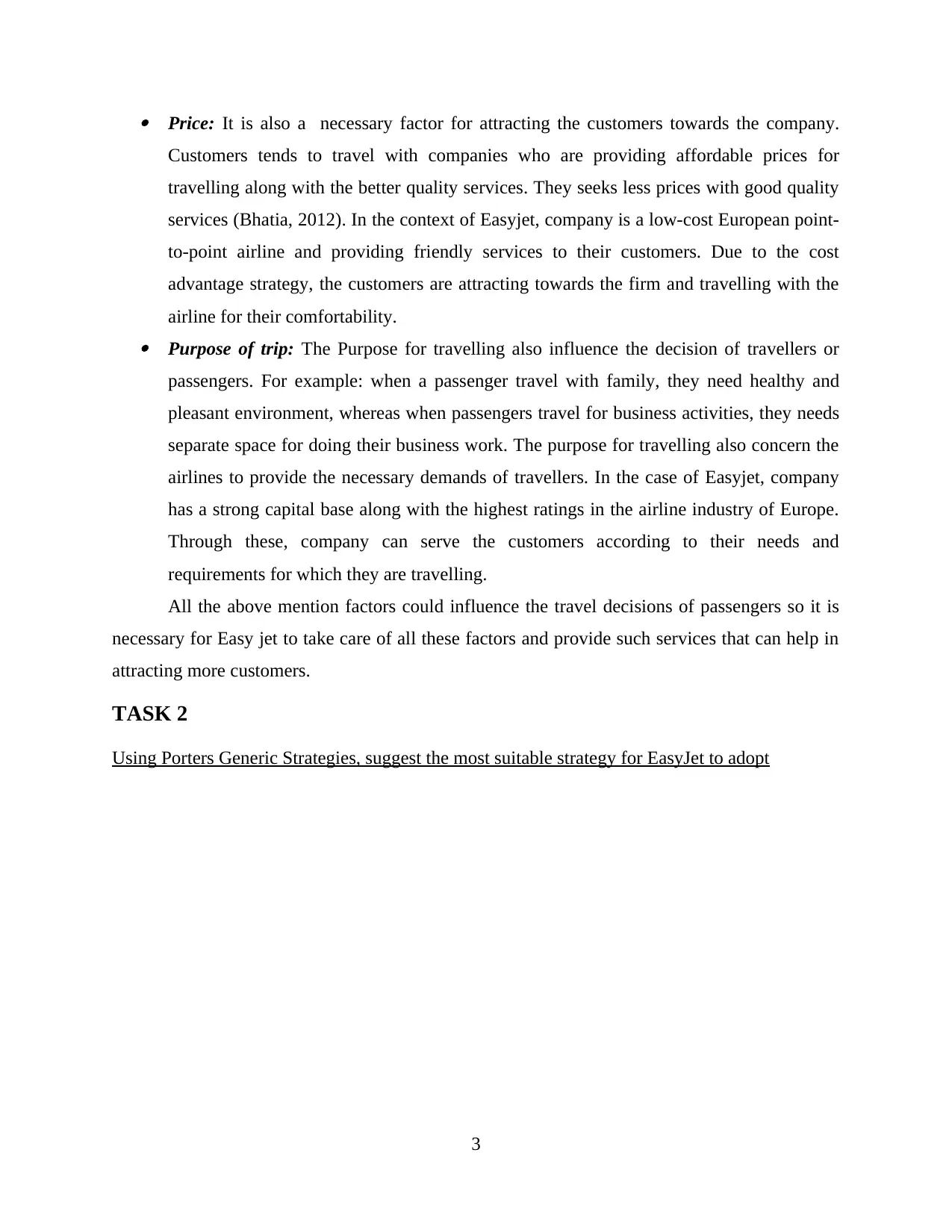
Price: It is also a necessary factor for attracting the customers towards the company.
Customers tends to travel with companies who are providing affordable prices for
travelling along with the better quality services. They seeks less prices with good quality
services (Bhatia, 2012). In the context of Easyjet, company is a low-cost European point-
to-point airline and providing friendly services to their customers. Due to the cost
advantage strategy, the customers are attracting towards the firm and travelling with the
airline for their comfortability. Purpose of trip: The Purpose for travelling also influence the decision of travellers or
passengers. For example: when a passenger travel with family, they need healthy and
pleasant environment, whereas when passengers travel for business activities, they needs
separate space for doing their business work. The purpose for travelling also concern the
airlines to provide the necessary demands of travellers. In the case of Easyjet, company
has a strong capital base along with the highest ratings in the airline industry of Europe.
Through these, company can serve the customers according to their needs and
requirements for which they are travelling.
All the above mention factors could influence the travel decisions of passengers so it is
necessary for Easy jet to take care of all these factors and provide such services that can help in
attracting more customers.
TASK 2
Using Porters Generic Strategies, suggest the most suitable strategy for EasyJet to adopt
3
Customers tends to travel with companies who are providing affordable prices for
travelling along with the better quality services. They seeks less prices with good quality
services (Bhatia, 2012). In the context of Easyjet, company is a low-cost European point-
to-point airline and providing friendly services to their customers. Due to the cost
advantage strategy, the customers are attracting towards the firm and travelling with the
airline for their comfortability. Purpose of trip: The Purpose for travelling also influence the decision of travellers or
passengers. For example: when a passenger travel with family, they need healthy and
pleasant environment, whereas when passengers travel for business activities, they needs
separate space for doing their business work. The purpose for travelling also concern the
airlines to provide the necessary demands of travellers. In the case of Easyjet, company
has a strong capital base along with the highest ratings in the airline industry of Europe.
Through these, company can serve the customers according to their needs and
requirements for which they are travelling.
All the above mention factors could influence the travel decisions of passengers so it is
necessary for Easy jet to take care of all these factors and provide such services that can help in
attracting more customers.
TASK 2
Using Porters Generic Strategies, suggest the most suitable strategy for EasyJet to adopt
3
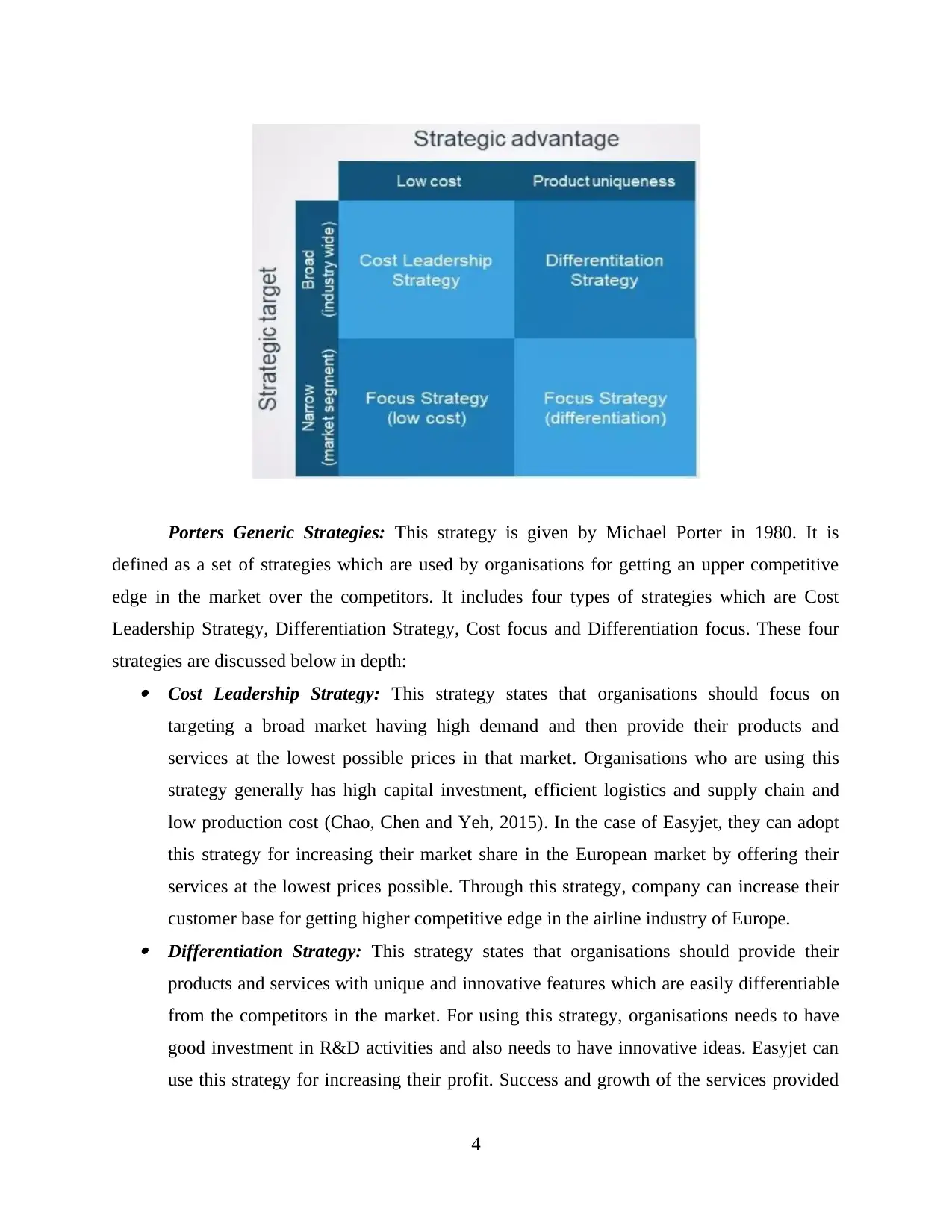
Porters Generic Strategies: This strategy is given by Michael Porter in 1980. It is
defined as a set of strategies which are used by organisations for getting an upper competitive
edge in the market over the competitors. It includes four types of strategies which are Cost
Leadership Strategy, Differentiation Strategy, Cost focus and Differentiation focus. These four
strategies are discussed below in depth: Cost Leadership Strategy: This strategy states that organisations should focus on
targeting a broad market having high demand and then provide their products and
services at the lowest possible prices in that market. Organisations who are using this
strategy generally has high capital investment, efficient logistics and supply chain and
low production cost (Chao, Chen and Yeh, 2015). In the case of Easyjet, they can adopt
this strategy for increasing their market share in the European market by offering their
services at the lowest prices possible. Through this strategy, company can increase their
customer base for getting higher competitive edge in the airline industry of Europe. Differentiation Strategy: This strategy states that organisations should provide their
products and services with unique and innovative features which are easily differentiable
from the competitors in the market. For using this strategy, organisations needs to have
good investment in R&D activities and also needs to have innovative ideas. Easyjet can
use this strategy for increasing their profit. Success and growth of the services provided
4
defined as a set of strategies which are used by organisations for getting an upper competitive
edge in the market over the competitors. It includes four types of strategies which are Cost
Leadership Strategy, Differentiation Strategy, Cost focus and Differentiation focus. These four
strategies are discussed below in depth: Cost Leadership Strategy: This strategy states that organisations should focus on
targeting a broad market having high demand and then provide their products and
services at the lowest possible prices in that market. Organisations who are using this
strategy generally has high capital investment, efficient logistics and supply chain and
low production cost (Chao, Chen and Yeh, 2015). In the case of Easyjet, they can adopt
this strategy for increasing their market share in the European market by offering their
services at the lowest prices possible. Through this strategy, company can increase their
customer base for getting higher competitive edge in the airline industry of Europe. Differentiation Strategy: This strategy states that organisations should provide their
products and services with unique and innovative features which are easily differentiable
from the competitors in the market. For using this strategy, organisations needs to have
good investment in R&D activities and also needs to have innovative ideas. Easyjet can
use this strategy for increasing their profit. Success and growth of the services provided
4
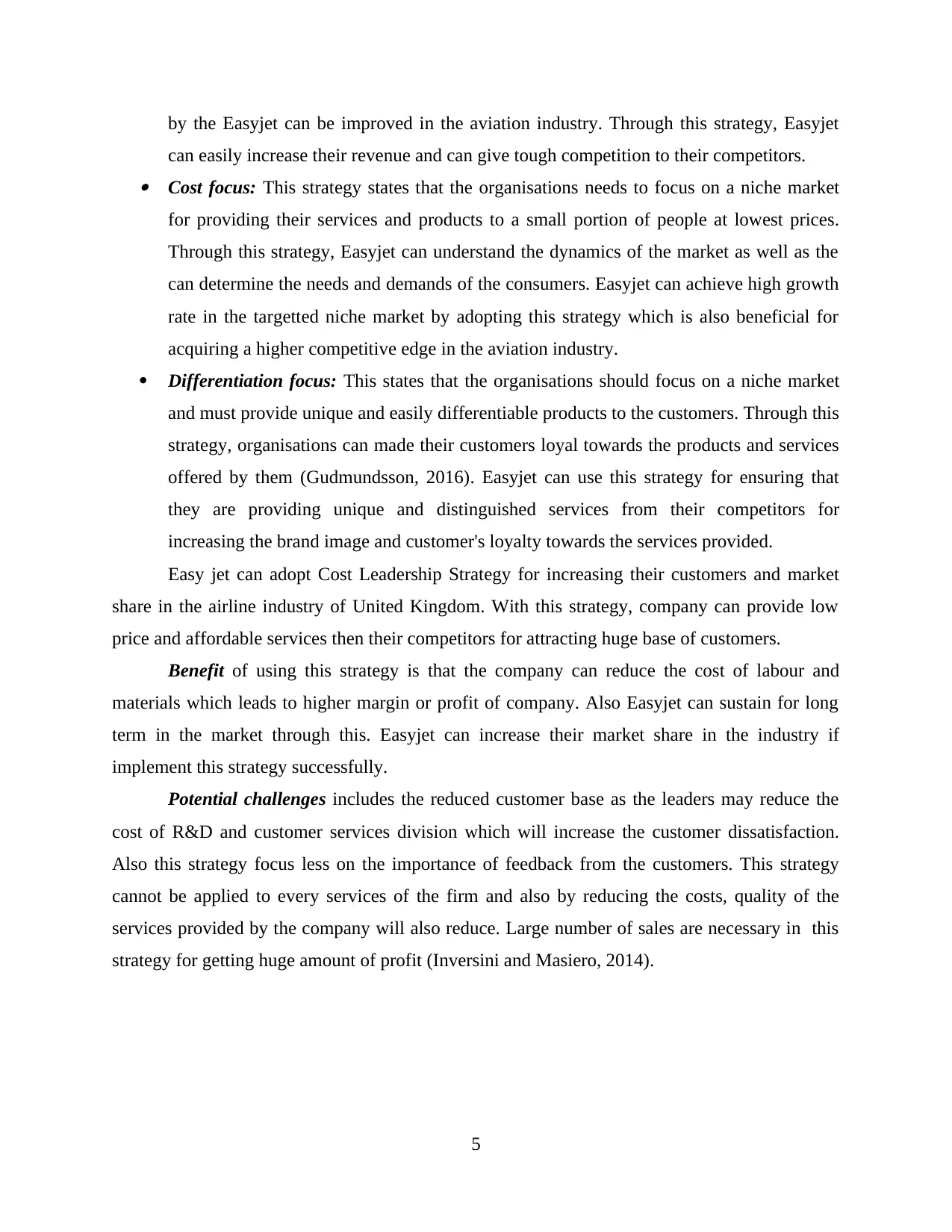
by the Easyjet can be improved in the aviation industry. Through this strategy, Easyjet
can easily increase their revenue and can give tough competition to their competitors. Cost focus: This strategy states that the organisations needs to focus on a niche market
for providing their services and products to a small portion of people at lowest prices.
Through this strategy, Easyjet can understand the dynamics of the market as well as the
can determine the needs and demands of the consumers. Easyjet can achieve high growth
rate in the targetted niche market by adopting this strategy which is also beneficial for
acquiring a higher competitive edge in the aviation industry.
Differentiation focus: This states that the organisations should focus on a niche market
and must provide unique and easily differentiable products to the customers. Through this
strategy, organisations can made their customers loyal towards the products and services
offered by them (Gudmundsson, 2016). Easyjet can use this strategy for ensuring that
they are providing unique and distinguished services from their competitors for
increasing the brand image and customer's loyalty towards the services provided.
Easy jet can adopt Cost Leadership Strategy for increasing their customers and market
share in the airline industry of United Kingdom. With this strategy, company can provide low
price and affordable services then their competitors for attracting huge base of customers.
Benefit of using this strategy is that the company can reduce the cost of labour and
materials which leads to higher margin or profit of company. Also Easyjet can sustain for long
term in the market through this. Easyjet can increase their market share in the industry if
implement this strategy successfully.
Potential challenges includes the reduced customer base as the leaders may reduce the
cost of R&D and customer services division which will increase the customer dissatisfaction.
Also this strategy focus less on the importance of feedback from the customers. This strategy
cannot be applied to every services of the firm and also by reducing the costs, quality of the
services provided by the company will also reduce. Large number of sales are necessary in this
strategy for getting huge amount of profit (Inversini and Masiero, 2014).
5
can easily increase their revenue and can give tough competition to their competitors. Cost focus: This strategy states that the organisations needs to focus on a niche market
for providing their services and products to a small portion of people at lowest prices.
Through this strategy, Easyjet can understand the dynamics of the market as well as the
can determine the needs and demands of the consumers. Easyjet can achieve high growth
rate in the targetted niche market by adopting this strategy which is also beneficial for
acquiring a higher competitive edge in the aviation industry.
Differentiation focus: This states that the organisations should focus on a niche market
and must provide unique and easily differentiable products to the customers. Through this
strategy, organisations can made their customers loyal towards the products and services
offered by them (Gudmundsson, 2016). Easyjet can use this strategy for ensuring that
they are providing unique and distinguished services from their competitors for
increasing the brand image and customer's loyalty towards the services provided.
Easy jet can adopt Cost Leadership Strategy for increasing their customers and market
share in the airline industry of United Kingdom. With this strategy, company can provide low
price and affordable services then their competitors for attracting huge base of customers.
Benefit of using this strategy is that the company can reduce the cost of labour and
materials which leads to higher margin or profit of company. Also Easyjet can sustain for long
term in the market through this. Easyjet can increase their market share in the industry if
implement this strategy successfully.
Potential challenges includes the reduced customer base as the leaders may reduce the
cost of R&D and customer services division which will increase the customer dissatisfaction.
Also this strategy focus less on the importance of feedback from the customers. This strategy
cannot be applied to every services of the firm and also by reducing the costs, quality of the
services provided by the company will also reduce. Large number of sales are necessary in this
strategy for getting huge amount of profit (Inversini and Masiero, 2014).
5
Paraphrase This Document
Need a fresh take? Get an instant paraphrase of this document with our AI Paraphraser
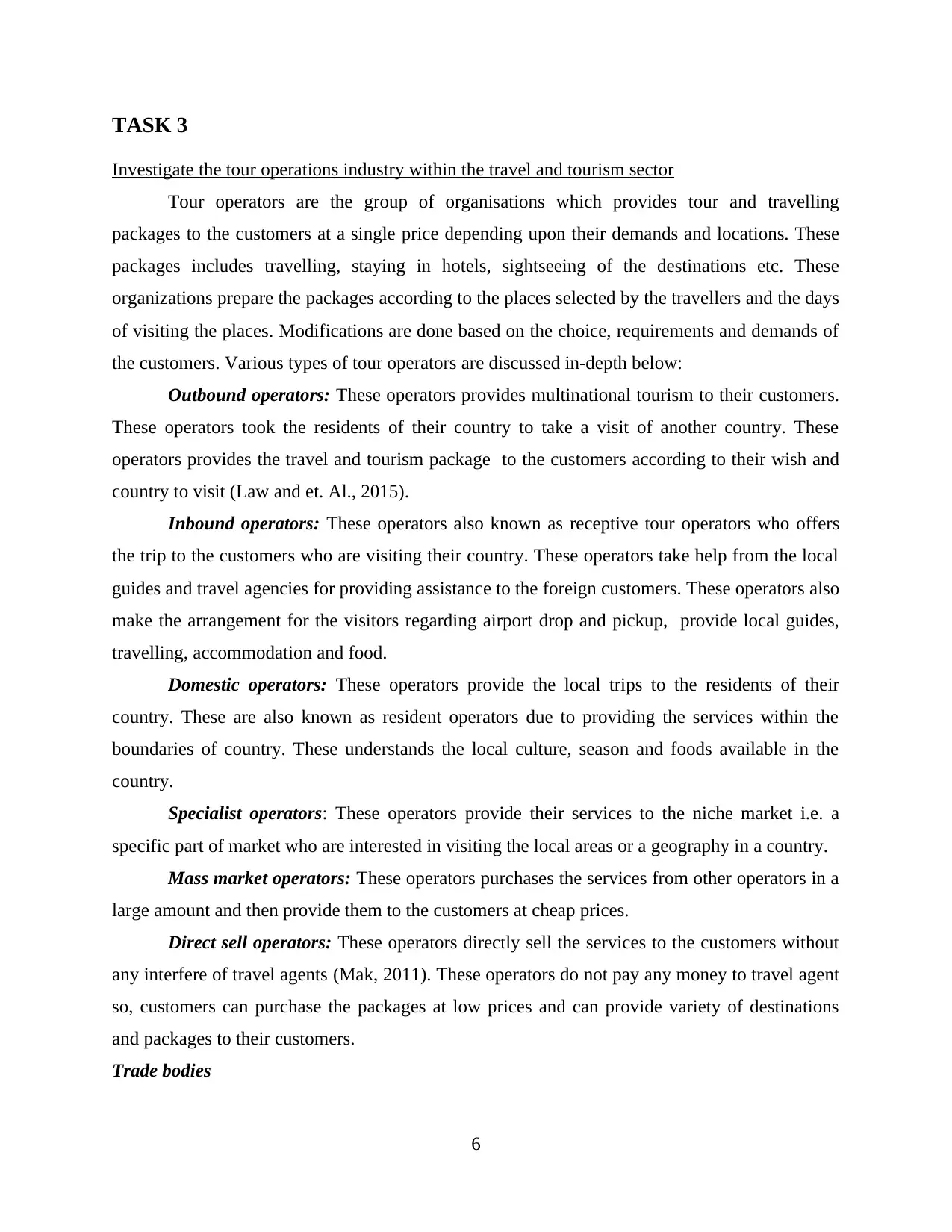
TASK 3
Investigate the tour operations industry within the travel and tourism sector
Tour operators are the group of organisations which provides tour and travelling
packages to the customers at a single price depending upon their demands and locations. These
packages includes travelling, staying in hotels, sightseeing of the destinations etc. These
organizations prepare the packages according to the places selected by the travellers and the days
of visiting the places. Modifications are done based on the choice, requirements and demands of
the customers. Various types of tour operators are discussed in-depth below:
Outbound operators: These operators provides multinational tourism to their customers.
These operators took the residents of their country to take a visit of another country. These
operators provides the travel and tourism package to the customers according to their wish and
country to visit (Law and et. Al., 2015).
Inbound operators: These operators also known as receptive tour operators who offers
the trip to the customers who are visiting their country. These operators take help from the local
guides and travel agencies for providing assistance to the foreign customers. These operators also
make the arrangement for the visitors regarding airport drop and pickup, provide local guides,
travelling, accommodation and food.
Domestic operators: These operators provide the local trips to the residents of their
country. These are also known as resident operators due to providing the services within the
boundaries of country. These understands the local culture, season and foods available in the
country.
Specialist operators: These operators provide their services to the niche market i.e. a
specific part of market who are interested in visiting the local areas or a geography in a country.
Mass market operators: These operators purchases the services from other operators in a
large amount and then provide them to the customers at cheap prices.
Direct sell operators: These operators directly sell the services to the customers without
any interfere of travel agents (Mak, 2011). These operators do not pay any money to travel agent
so, customers can purchase the packages at low prices and can provide variety of destinations
and packages to their customers.
Trade bodies
6
Investigate the tour operations industry within the travel and tourism sector
Tour operators are the group of organisations which provides tour and travelling
packages to the customers at a single price depending upon their demands and locations. These
packages includes travelling, staying in hotels, sightseeing of the destinations etc. These
organizations prepare the packages according to the places selected by the travellers and the days
of visiting the places. Modifications are done based on the choice, requirements and demands of
the customers. Various types of tour operators are discussed in-depth below:
Outbound operators: These operators provides multinational tourism to their customers.
These operators took the residents of their country to take a visit of another country. These
operators provides the travel and tourism package to the customers according to their wish and
country to visit (Law and et. Al., 2015).
Inbound operators: These operators also known as receptive tour operators who offers
the trip to the customers who are visiting their country. These operators take help from the local
guides and travel agencies for providing assistance to the foreign customers. These operators also
make the arrangement for the visitors regarding airport drop and pickup, provide local guides,
travelling, accommodation and food.
Domestic operators: These operators provide the local trips to the residents of their
country. These are also known as resident operators due to providing the services within the
boundaries of country. These understands the local culture, season and foods available in the
country.
Specialist operators: These operators provide their services to the niche market i.e. a
specific part of market who are interested in visiting the local areas or a geography in a country.
Mass market operators: These operators purchases the services from other operators in a
large amount and then provide them to the customers at cheap prices.
Direct sell operators: These operators directly sell the services to the customers without
any interfere of travel agents (Mak, 2011). These operators do not pay any money to travel agent
so, customers can purchase the packages at low prices and can provide variety of destinations
and packages to their customers.
Trade bodies
6
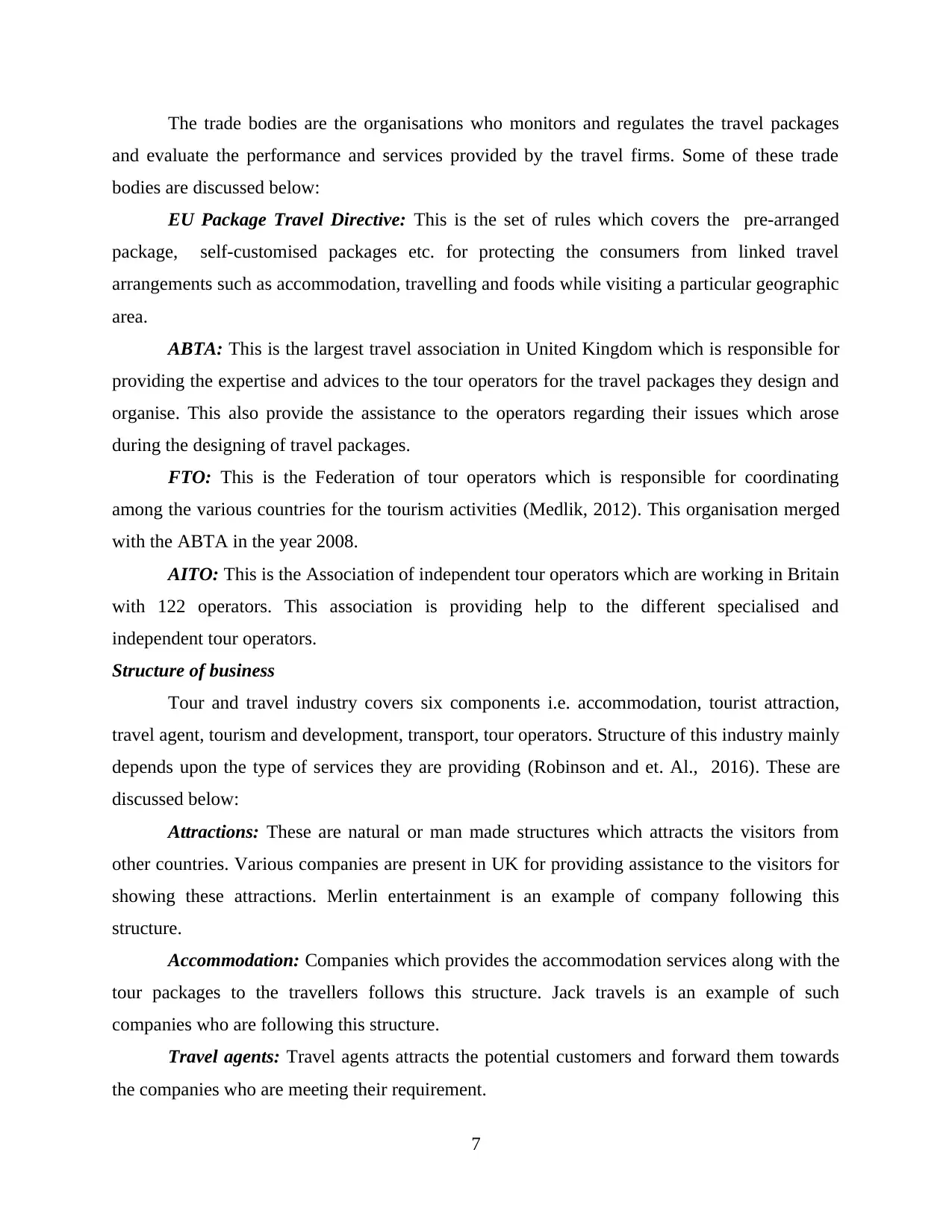
The trade bodies are the organisations who monitors and regulates the travel packages
and evaluate the performance and services provided by the travel firms. Some of these trade
bodies are discussed below:
EU Package Travel Directive: This is the set of rules which covers the pre-arranged
package, self-customised packages etc. for protecting the consumers from linked travel
arrangements such as accommodation, travelling and foods while visiting a particular geographic
area.
ABTA: This is the largest travel association in United Kingdom which is responsible for
providing the expertise and advices to the tour operators for the travel packages they design and
organise. This also provide the assistance to the operators regarding their issues which arose
during the designing of travel packages.
FTO: This is the Federation of tour operators which is responsible for coordinating
among the various countries for the tourism activities (Medlik, 2012). This organisation merged
with the ABTA in the year 2008.
AITO: This is the Association of independent tour operators which are working in Britain
with 122 operators. This association is providing help to the different specialised and
independent tour operators.
Structure of business
Tour and travel industry covers six components i.e. accommodation, tourist attraction,
travel agent, tourism and development, transport, tour operators. Structure of this industry mainly
depends upon the type of services they are providing (Robinson and et. Al., 2016). These are
discussed below:
Attractions: These are natural or man made structures which attracts the visitors from
other countries. Various companies are present in UK for providing assistance to the visitors for
showing these attractions. Merlin entertainment is an example of company following this
structure.
Accommodation: Companies which provides the accommodation services along with the
tour packages to the travellers follows this structure. Jack travels is an example of such
companies who are following this structure.
Travel agents: Travel agents attracts the potential customers and forward them towards
the companies who are meeting their requirement.
7
and evaluate the performance and services provided by the travel firms. Some of these trade
bodies are discussed below:
EU Package Travel Directive: This is the set of rules which covers the pre-arranged
package, self-customised packages etc. for protecting the consumers from linked travel
arrangements such as accommodation, travelling and foods while visiting a particular geographic
area.
ABTA: This is the largest travel association in United Kingdom which is responsible for
providing the expertise and advices to the tour operators for the travel packages they design and
organise. This also provide the assistance to the operators regarding their issues which arose
during the designing of travel packages.
FTO: This is the Federation of tour operators which is responsible for coordinating
among the various countries for the tourism activities (Medlik, 2012). This organisation merged
with the ABTA in the year 2008.
AITO: This is the Association of independent tour operators which are working in Britain
with 122 operators. This association is providing help to the different specialised and
independent tour operators.
Structure of business
Tour and travel industry covers six components i.e. accommodation, tourist attraction,
travel agent, tourism and development, transport, tour operators. Structure of this industry mainly
depends upon the type of services they are providing (Robinson and et. Al., 2016). These are
discussed below:
Attractions: These are natural or man made structures which attracts the visitors from
other countries. Various companies are present in UK for providing assistance to the visitors for
showing these attractions. Merlin entertainment is an example of company following this
structure.
Accommodation: Companies which provides the accommodation services along with the
tour packages to the travellers follows this structure. Jack travels is an example of such
companies who are following this structure.
Travel agents: Travel agents attracts the potential customers and forward them towards
the companies who are meeting their requirement.
7
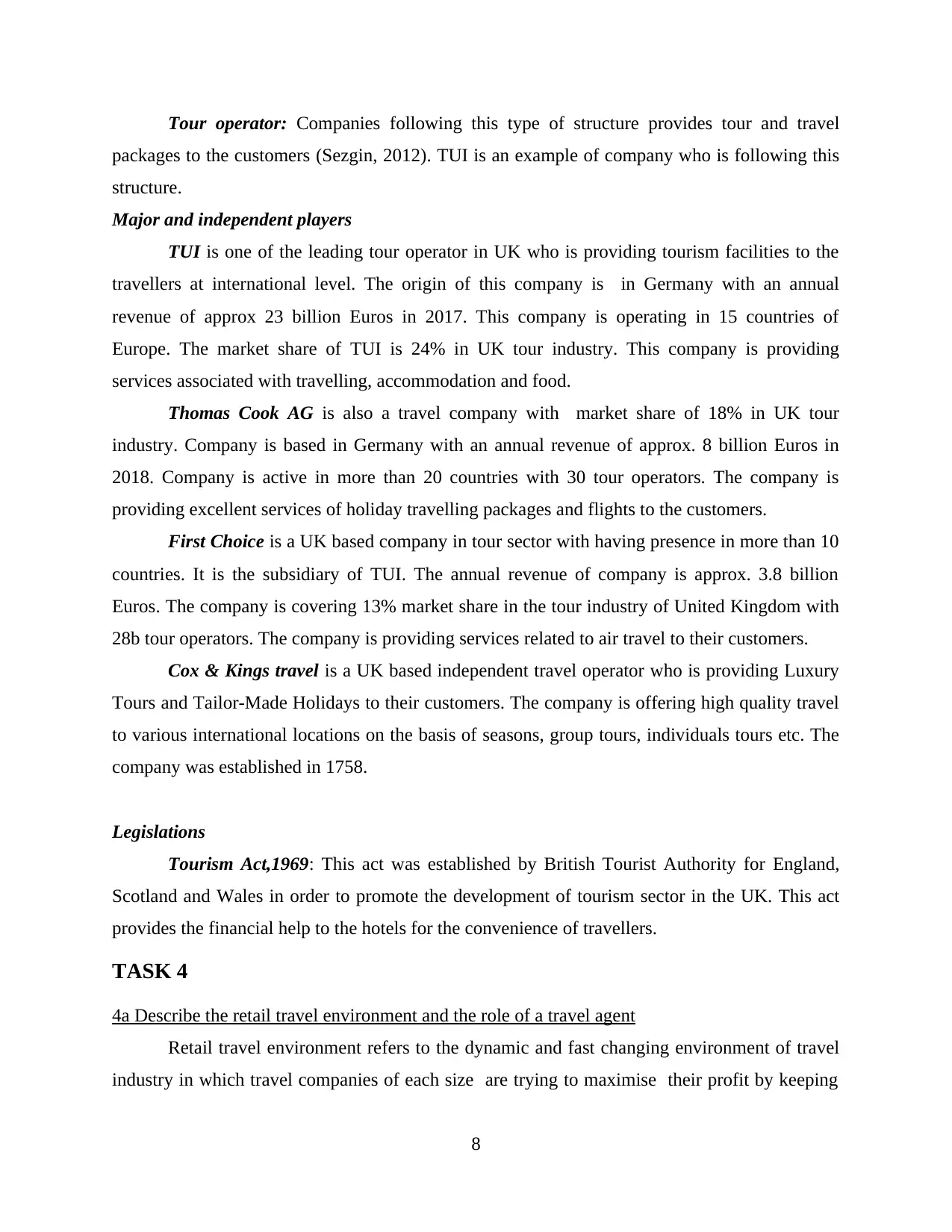
Tour operator: Companies following this type of structure provides tour and travel
packages to the customers (Sezgin, 2012). TUI is an example of company who is following this
structure.
Major and independent players
TUI is one of the leading tour operator in UK who is providing tourism facilities to the
travellers at international level. The origin of this company is in Germany with an annual
revenue of approx 23 billion Euros in 2017. This company is operating in 15 countries of
Europe. The market share of TUI is 24% in UK tour industry. This company is providing
services associated with travelling, accommodation and food.
Thomas Cook AG is also a travel company with market share of 18% in UK tour
industry. Company is based in Germany with an annual revenue of approx. 8 billion Euros in
2018. Company is active in more than 20 countries with 30 tour operators. The company is
providing excellent services of holiday travelling packages and flights to the customers.
First Choice is a UK based company in tour sector with having presence in more than 10
countries. It is the subsidiary of TUI. The annual revenue of company is approx. 3.8 billion
Euros. The company is covering 13% market share in the tour industry of United Kingdom with
28b tour operators. The company is providing services related to air travel to their customers.
Cox & Kings travel is a UK based independent travel operator who is providing Luxury
Tours and Tailor-Made Holidays to their customers. The company is offering high quality travel
to various international locations on the basis of seasons, group tours, individuals tours etc. The
company was established in 1758.
Legislations
Tourism Act,1969: This act was established by British Tourist Authority for England,
Scotland and Wales in order to promote the development of tourism sector in the UK. This act
provides the financial help to the hotels for the convenience of travellers.
TASK 4
4a Describe the retail travel environment and the role of a travel agent
Retail travel environment refers to the dynamic and fast changing environment of travel
industry in which travel companies of each size are trying to maximise their profit by keeping
8
packages to the customers (Sezgin, 2012). TUI is an example of company who is following this
structure.
Major and independent players
TUI is one of the leading tour operator in UK who is providing tourism facilities to the
travellers at international level. The origin of this company is in Germany with an annual
revenue of approx 23 billion Euros in 2017. This company is operating in 15 countries of
Europe. The market share of TUI is 24% in UK tour industry. This company is providing
services associated with travelling, accommodation and food.
Thomas Cook AG is also a travel company with market share of 18% in UK tour
industry. Company is based in Germany with an annual revenue of approx. 8 billion Euros in
2018. Company is active in more than 20 countries with 30 tour operators. The company is
providing excellent services of holiday travelling packages and flights to the customers.
First Choice is a UK based company in tour sector with having presence in more than 10
countries. It is the subsidiary of TUI. The annual revenue of company is approx. 3.8 billion
Euros. The company is covering 13% market share in the tour industry of United Kingdom with
28b tour operators. The company is providing services related to air travel to their customers.
Cox & Kings travel is a UK based independent travel operator who is providing Luxury
Tours and Tailor-Made Holidays to their customers. The company is offering high quality travel
to various international locations on the basis of seasons, group tours, individuals tours etc. The
company was established in 1758.
Legislations
Tourism Act,1969: This act was established by British Tourist Authority for England,
Scotland and Wales in order to promote the development of tourism sector in the UK. This act
provides the financial help to the hotels for the convenience of travellers.
TASK 4
4a Describe the retail travel environment and the role of a travel agent
Retail travel environment refers to the dynamic and fast changing environment of travel
industry in which travel companies of each size are trying to maximise their profit by keeping
8
Secure Best Marks with AI Grader
Need help grading? Try our AI Grader for instant feedback on your assignments.
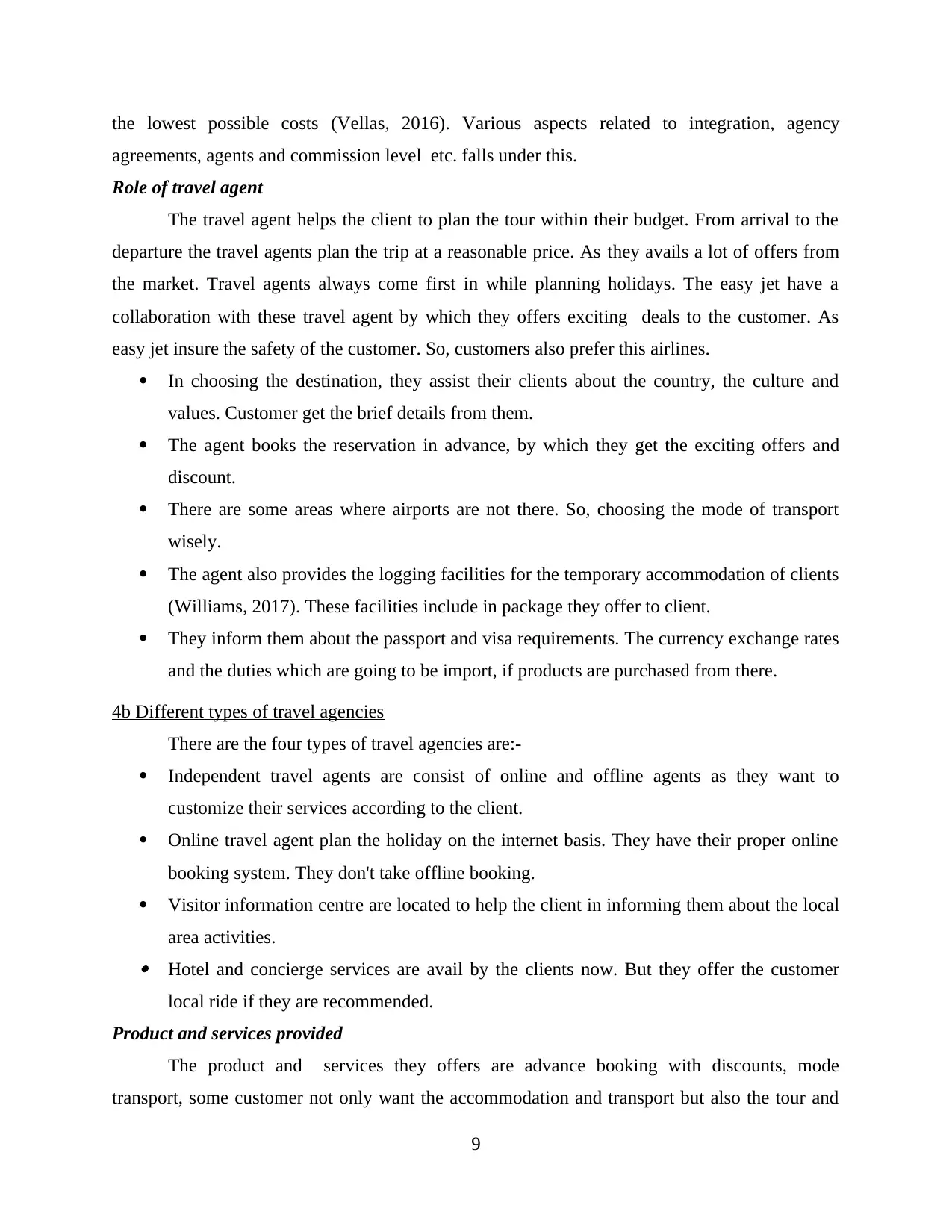
the lowest possible costs (Vellas, 2016). Various aspects related to integration, agency
agreements, agents and commission level etc. falls under this.
Role of travel agent
The travel agent helps the client to plan the tour within their budget. From arrival to the
departure the travel agents plan the trip at a reasonable price. As they avails a lot of offers from
the market. Travel agents always come first in while planning holidays. The easy jet have a
collaboration with these travel agent by which they offers exciting deals to the customer. As
easy jet insure the safety of the customer. So, customers also prefer this airlines.
In choosing the destination, they assist their clients about the country, the culture and
values. Customer get the brief details from them.
The agent books the reservation in advance, by which they get the exciting offers and
discount.
There are some areas where airports are not there. So, choosing the mode of transport
wisely.
The agent also provides the logging facilities for the temporary accommodation of clients
(Williams, 2017). These facilities include in package they offer to client.
They inform them about the passport and visa requirements. The currency exchange rates
and the duties which are going to be import, if products are purchased from there.
4b Different types of travel agencies
There are the four types of travel agencies are:-
Independent travel agents are consist of online and offline agents as they want to
customize their services according to the client.
Online travel agent plan the holiday on the internet basis. They have their proper online
booking system. They don't take offline booking.
Visitor information centre are located to help the client in informing them about the local
area activities. Hotel and concierge services are avail by the clients now. But they offer the customer
local ride if they are recommended.
Product and services provided
The product and services they offers are advance booking with discounts, mode
transport, some customer not only want the accommodation and transport but also the tour and
9
agreements, agents and commission level etc. falls under this.
Role of travel agent
The travel agent helps the client to plan the tour within their budget. From arrival to the
departure the travel agents plan the trip at a reasonable price. As they avails a lot of offers from
the market. Travel agents always come first in while planning holidays. The easy jet have a
collaboration with these travel agent by which they offers exciting deals to the customer. As
easy jet insure the safety of the customer. So, customers also prefer this airlines.
In choosing the destination, they assist their clients about the country, the culture and
values. Customer get the brief details from them.
The agent books the reservation in advance, by which they get the exciting offers and
discount.
There are some areas where airports are not there. So, choosing the mode of transport
wisely.
The agent also provides the logging facilities for the temporary accommodation of clients
(Williams, 2017). These facilities include in package they offer to client.
They inform them about the passport and visa requirements. The currency exchange rates
and the duties which are going to be import, if products are purchased from there.
4b Different types of travel agencies
There are the four types of travel agencies are:-
Independent travel agents are consist of online and offline agents as they want to
customize their services according to the client.
Online travel agent plan the holiday on the internet basis. They have their proper online
booking system. They don't take offline booking.
Visitor information centre are located to help the client in informing them about the local
area activities. Hotel and concierge services are avail by the clients now. But they offer the customer
local ride if they are recommended.
Product and services provided
The product and services they offers are advance booking with discounts, mode
transport, some customer not only want the accommodation and transport but also the tour and
9
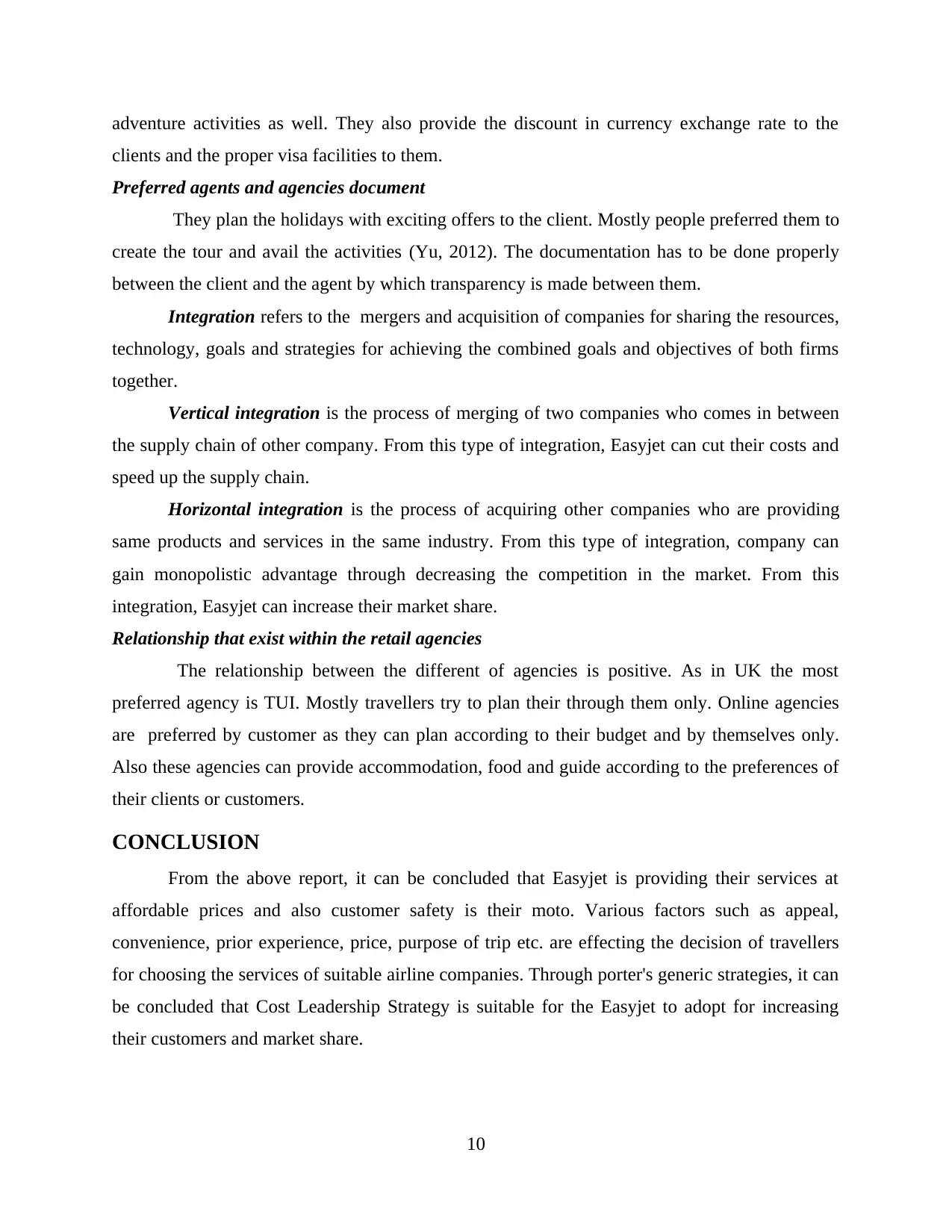
adventure activities as well. They also provide the discount in currency exchange rate to the
clients and the proper visa facilities to them.
Preferred agents and agencies document
They plan the holidays with exciting offers to the client. Mostly people preferred them to
create the tour and avail the activities (Yu, 2012). The documentation has to be done properly
between the client and the agent by which transparency is made between them.
Integration refers to the mergers and acquisition of companies for sharing the resources,
technology, goals and strategies for achieving the combined goals and objectives of both firms
together.
Vertical integration is the process of merging of two companies who comes in between
the supply chain of other company. From this type of integration, Easyjet can cut their costs and
speed up the supply chain.
Horizontal integration is the process of acquiring other companies who are providing
same products and services in the same industry. From this type of integration, company can
gain monopolistic advantage through decreasing the competition in the market. From this
integration, Easyjet can increase their market share.
Relationship that exist within the retail agencies
The relationship between the different of agencies is positive. As in UK the most
preferred agency is TUI. Mostly travellers try to plan their through them only. Online agencies
are preferred by customer as they can plan according to their budget and by themselves only.
Also these agencies can provide accommodation, food and guide according to the preferences of
their clients or customers.
CONCLUSION
From the above report, it can be concluded that Easyjet is providing their services at
affordable prices and also customer safety is their moto. Various factors such as appeal,
convenience, prior experience, price, purpose of trip etc. are effecting the decision of travellers
for choosing the services of suitable airline companies. Through porter's generic strategies, it can
be concluded that Cost Leadership Strategy is suitable for the Easyjet to adopt for increasing
their customers and market share.
10
clients and the proper visa facilities to them.
Preferred agents and agencies document
They plan the holidays with exciting offers to the client. Mostly people preferred them to
create the tour and avail the activities (Yu, 2012). The documentation has to be done properly
between the client and the agent by which transparency is made between them.
Integration refers to the mergers and acquisition of companies for sharing the resources,
technology, goals and strategies for achieving the combined goals and objectives of both firms
together.
Vertical integration is the process of merging of two companies who comes in between
the supply chain of other company. From this type of integration, Easyjet can cut their costs and
speed up the supply chain.
Horizontal integration is the process of acquiring other companies who are providing
same products and services in the same industry. From this type of integration, company can
gain monopolistic advantage through decreasing the competition in the market. From this
integration, Easyjet can increase their market share.
Relationship that exist within the retail agencies
The relationship between the different of agencies is positive. As in UK the most
preferred agency is TUI. Mostly travellers try to plan their through them only. Online agencies
are preferred by customer as they can plan according to their budget and by themselves only.
Also these agencies can provide accommodation, food and guide according to the preferences of
their clients or customers.
CONCLUSION
From the above report, it can be concluded that Easyjet is providing their services at
affordable prices and also customer safety is their moto. Various factors such as appeal,
convenience, prior experience, price, purpose of trip etc. are effecting the decision of travellers
for choosing the services of suitable airline companies. Through porter's generic strategies, it can
be concluded that Cost Leadership Strategy is suitable for the Easyjet to adopt for increasing
their customers and market share.
10
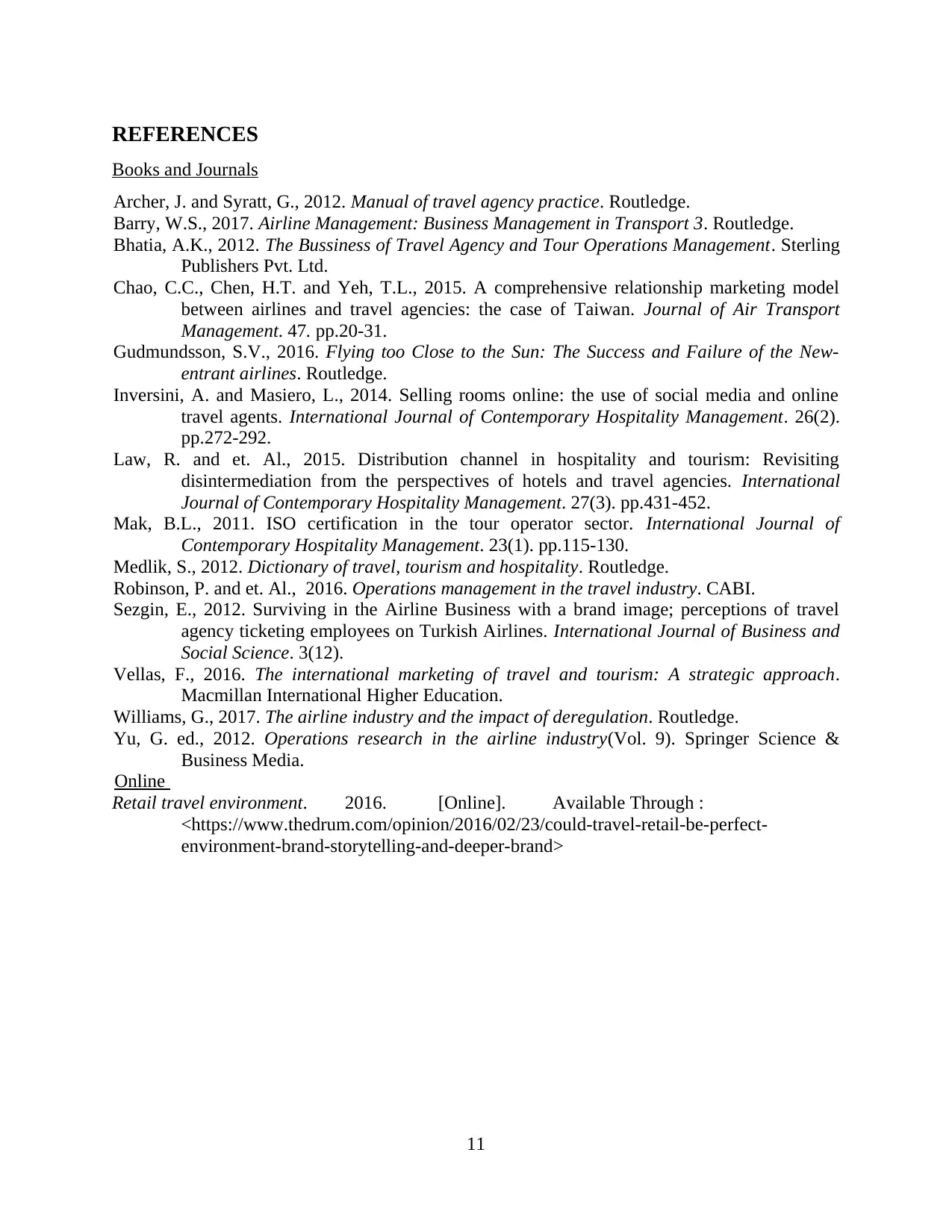
REFERENCES
Books and Journals
Archer, J. and Syratt, G., 2012. Manual of travel agency practice. Routledge.
Barry, W.S., 2017. Airline Management: Business Management in Transport 3. Routledge.
Bhatia, A.K., 2012. The Bussiness of Travel Agency and Tour Operations Management. Sterling
Publishers Pvt. Ltd.
Chao, C.C., Chen, H.T. and Yeh, T.L., 2015. A comprehensive relationship marketing model
between airlines and travel agencies: the case of Taiwan. Journal of Air Transport
Management. 47. pp.20-31.
Gudmundsson, S.V., 2016. Flying too Close to the Sun: The Success and Failure of the New-
entrant airlines. Routledge.
Inversini, A. and Masiero, L., 2014. Selling rooms online: the use of social media and online
travel agents. International Journal of Contemporary Hospitality Management. 26(2).
pp.272-292.
Law, R. and et. Al., 2015. Distribution channel in hospitality and tourism: Revisiting
disintermediation from the perspectives of hotels and travel agencies. International
Journal of Contemporary Hospitality Management. 27(3). pp.431-452.
Mak, B.L., 2011. ISO certification in the tour operator sector. International Journal of
Contemporary Hospitality Management. 23(1). pp.115-130.
Medlik, S., 2012. Dictionary of travel, tourism and hospitality. Routledge.
Robinson, P. and et. Al., 2016. Operations management in the travel industry. CABI.
Sezgin, E., 2012. Surviving in the Airline Business with a brand image; perceptions of travel
agency ticketing employees on Turkish Airlines. International Journal of Business and
Social Science. 3(12).
Vellas, F., 2016. The international marketing of travel and tourism: A strategic approach.
Macmillan International Higher Education.
Williams, G., 2017. The airline industry and the impact of deregulation. Routledge.
Yu, G. ed., 2012. Operations research in the airline industry(Vol. 9). Springer Science &
Business Media.
Online
Retail travel environment. 2016. [Online]. Available Through :
<https://www.thedrum.com/opinion/2016/02/23/could-travel-retail-be-perfect-
environment-brand-storytelling-and-deeper-brand>
11
Books and Journals
Archer, J. and Syratt, G., 2012. Manual of travel agency practice. Routledge.
Barry, W.S., 2017. Airline Management: Business Management in Transport 3. Routledge.
Bhatia, A.K., 2012. The Bussiness of Travel Agency and Tour Operations Management. Sterling
Publishers Pvt. Ltd.
Chao, C.C., Chen, H.T. and Yeh, T.L., 2015. A comprehensive relationship marketing model
between airlines and travel agencies: the case of Taiwan. Journal of Air Transport
Management. 47. pp.20-31.
Gudmundsson, S.V., 2016. Flying too Close to the Sun: The Success and Failure of the New-
entrant airlines. Routledge.
Inversini, A. and Masiero, L., 2014. Selling rooms online: the use of social media and online
travel agents. International Journal of Contemporary Hospitality Management. 26(2).
pp.272-292.
Law, R. and et. Al., 2015. Distribution channel in hospitality and tourism: Revisiting
disintermediation from the perspectives of hotels and travel agencies. International
Journal of Contemporary Hospitality Management. 27(3). pp.431-452.
Mak, B.L., 2011. ISO certification in the tour operator sector. International Journal of
Contemporary Hospitality Management. 23(1). pp.115-130.
Medlik, S., 2012. Dictionary of travel, tourism and hospitality. Routledge.
Robinson, P. and et. Al., 2016. Operations management in the travel industry. CABI.
Sezgin, E., 2012. Surviving in the Airline Business with a brand image; perceptions of travel
agency ticketing employees on Turkish Airlines. International Journal of Business and
Social Science. 3(12).
Vellas, F., 2016. The international marketing of travel and tourism: A strategic approach.
Macmillan International Higher Education.
Williams, G., 2017. The airline industry and the impact of deregulation. Routledge.
Yu, G. ed., 2012. Operations research in the airline industry(Vol. 9). Springer Science &
Business Media.
Online
Retail travel environment. 2016. [Online]. Available Through :
<https://www.thedrum.com/opinion/2016/02/23/could-travel-retail-be-perfect-
environment-brand-storytelling-and-deeper-brand>
11
1 out of 13
Related Documents
Your All-in-One AI-Powered Toolkit for Academic Success.
+13062052269
info@desklib.com
Available 24*7 on WhatsApp / Email
![[object Object]](/_next/static/media/star-bottom.7253800d.svg)
Unlock your academic potential
© 2024 | Zucol Services PVT LTD | All rights reserved.





